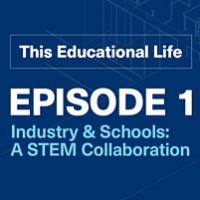Creating a pathway for lifelong learning
From classrooms to real-world problem solving, our programs empower students at every stage of their educational journey.
-
BTU Crew makes STEM education for students accessible and engaging, with hands-on energy efficiency lessons tailored for elementary, middle, and high school students. Integrated into existing lesson plans, BTU Crew sparks curiosity, strengthens analytical skills, and empowers teachers to enrich student outcomes.
Expert Insights
Explore more STEM education resources
-
Episode 1. Industry & Schools: A STEM Collaboration
How do you prepare students for jobs that might not exist yet? Discover how schools can leverage STEM education to empower the next generation for whatever comes next. -
From Classroom to Career: How Certifications Enable Practical STEM Learning and CTE Readiness
Schools and districts are under increasing pressure to align education with practical skill development, ensuring students are equipped for the workforce. This webinar will delve into innovative strategies for integrating STEM and Career Technical Education (CTE), arming students with foundational skills for a variety of careers—from technical roles to engineering positions. -
FAQs
Your STEM education questions, answered
STEM education for students means learning about science, technology, engineering, and math. It’s important because it helps students develop problem-solving skills and prepares them for successful jobs in the future.
STEM isn’t just about memorizing facts—it’s about figuring things out, thinking critically, and working with others to solve real-world problems. Lots of the fastest-growing careers need STEM skills, like computer science, medical research, and engineering. Even if you don’t want a science job, STEM teaches you to think, experiment, and adapt, which helps in all kinds of life situations. Plus, it can be a lot of fun and show you how the stuff you learn in school connects to everyday life!
STEM education can shape the future by giving students the skills they need to solve big problems and adapt to new technology.
When people learn science, technology, engineering, and math, they’re ready to invent things, make discoveries, and tackle challenges like climate change or disease. STEM helps build the next generation of doctors, engineers, programmers, and scientists. It also teaches important skills like teamwork, creative thinking, and finding solutions—all things that are needed in any career. By focusing on STEM, we set up young people to make an impact and keep improving the world.
Trane’s STEM education programs help students by giving them hands-on experiences and real-world skills they can use now and in their future careers.
Trane’s programs can turn school buildings into living labs, let students work on energy efficiency projects and use industry tools. They learn to solve problems, think critically, and explore different career options, from engineering to data analysis. Plus, students can earn certifications and gain practical knowledge that looks great on college and job applications. With Trane, students get more than just classroom lessons—they build confidence and skills that last a lifetime.
Trane’s STEM education programs work by turning your school building into a hands-on learning environment, where students engage through real-world projects and interactive lessons about energy and technology.
Here’s how it works: Trane provides ready-to-use lesson plans and digital tools that fit into normal classes. Students can analyze actual energy data from their own school, work on team projects, and solve problems using science, math, and technology. There are modules for beginners and advanced students, plus chances to earn industry related certifications in fields like AI and data analytics. Teachers get support and resources, and students gain practical skills they can use in college, careers, and life.
Contact Us
Provide future-forward experiences for your students
You care about your students’ future, and so does Trane. With our partnership and custom programs, you can give students the ideal school environment they need to transition into and thrive in their professional lives.








